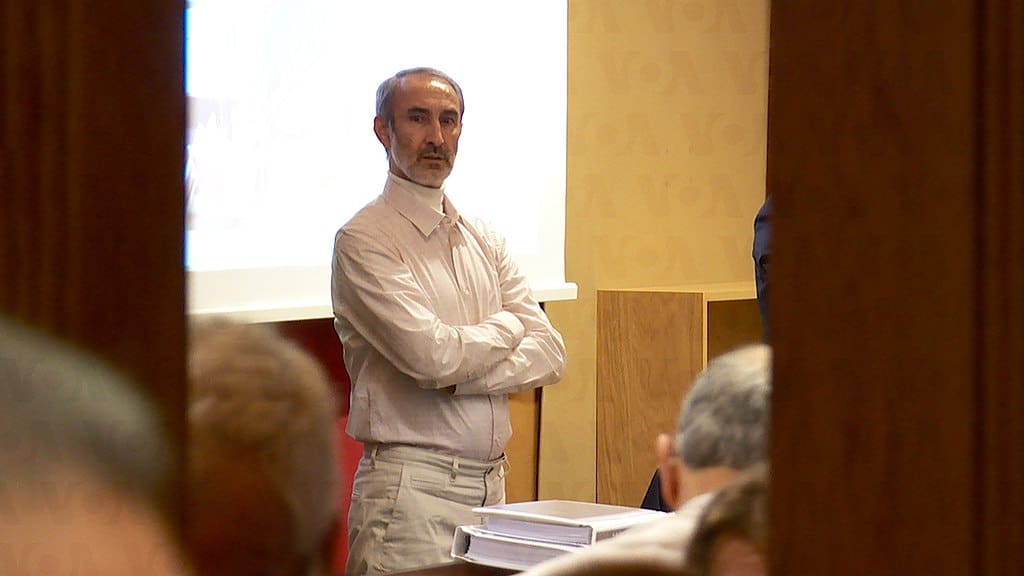
Hamid Nouri, the prisoner released in a swap between Iran and Sweden was found guilty of being a key figure in the 1988 executions of Iranian political prisoners, where according to different estimates between 2,800 to 30,000 Iranians were massacred.
Kevin Nha, Voice of America, Public domain, via Wikimedia Commons
Iran and Sweden exchanged prisoners last Saturday, which saw the release of European Union diplomat Johan Floderus and Swede Saeed Azizi by Tehran, swapped for a convicted criminal―Iranian Hamid Nouri.
The Sultanate of Oman played an important role in brokering the deal. State-funded Oman News Agency reported that the Arabian Gulf country’s involvement followed the “request of the Iranian and Swedish governments to help settle the issue.”
“Swedish citizens Johan Floderus and Saeed Azizi have been released after being imprisoned without reason by Iran. The Swedish government has worked intensively for them to be released. Today, they will land on Swedish soil and be reunited with their families and loved ones. Welcome home!”, announced Swedish Prime Minister Ulf Kristersson on X.
Swedish citizens Johan Floderus and Saeed Azizi have been released after being imprisoned without reason by Iran.
— SwedishPM (@SwedishPM) June 15, 2024
The Swedish government has worked intensively for them to be released.
Today, they will land on Swedish soil and be reunited with their families and loved ones.…
Det är med glädje jag kan meddela att Johan Floderus och Saeed Azizi nu är på ett plan hem till Sverige, och snart ska få återförenas med sina familjer. pic.twitter.com/95WqTTCEtp
— SwedishPM (@SwedishPM) June 15, 2024
“I’m in the sky but emotionally I’m in seventh heaven. I have been waiting for this for almost 800 days,” Floderus said during a recorded telephone call with Kristersson while on the journey back to Sweden.
Floderus was arrested in Iran in 2022 and charged with spying for Israel and “corruption on earth,” a crime that carries the death penalty.
The duo landed in Sweden late on Saturday, where they were reunited with their families.
In a separate statement, Prime Minister Kristersson commented on the trade, saying Iran had “used them both as pawns in a cynical negotiations game with the purpose of getting the Iranian citizen Hamid Nouri released from prison in Sweden,” adding that as prime minister he had “a special responsibility for Swedish citizens’ safety.”
That did not shield him from the opprobrium of the National Council of Resistance of Iran―a coalition of groups opposed to Iran’s Islamic Republic government (for which Nouri worked at the time)―which said Sweden had yielded to blackmail and hostage-taking tactics.
A former prison official, Nouri, 63, was sentenced to life in prison in Stockholm late last year for having played a role in various human rights abuses against political prisoners at Iran’s Gohardasht prison in 1988, among which one mass execution and instances of torture.
Nouri was detained at the airport of the Swedish capital of Stockholm in 2019. Police had received complaints about him from Iranian dissidents living in Sweden. By law, Swedish courts can try citizens for crimes committed abroad.
Lawyer Kenneth Lewis, who represented a dozen plaintiffs in the Nouri case in Sweden, said his clients were not consulted and were “appalled and devastated” over Nouri’s release. “This is an affront to the entire justice system and everyone who has participated in these trials,” he told Reuters.
Lewis added that his clients sympathized with the Swedish government’s efforts to get its citizens home but considered Nouri’s release “totally disproportionate.”
While Johan Floderus and Saeed Azizi can now enjoy their freedom, the same cannot be said about another Swedish citizen: the Swedish-Iranian Ahmadreza Djalali, who has been detained by the Iranian government for eight years.
Addressing criticisms regarding Djalali’s still unchanged situation, Kristersson told Swedish media that his government “did everything it could, and “certainly did not abandon him.”
Kristersson emphasized that Iran did not even want to broach the subject of a potential exchange with Djalali included, since the country does not recognize him as a Swedish citizen.
When asked what he thinks about the concern and anger exiled Iranians living in Sweden feel about the prisoner exchange, Kristersson replied that he understands their feelings, and that Nouri should still be in prison.
